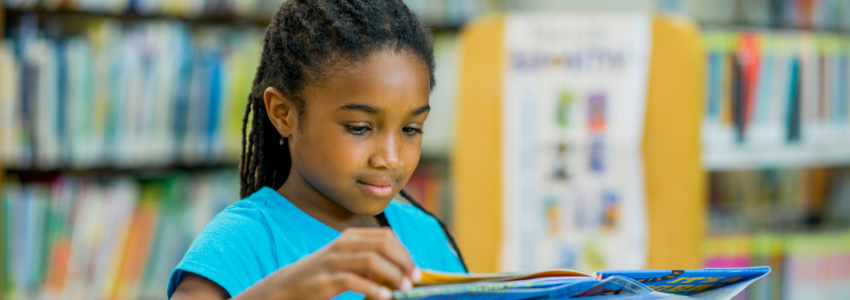

BLOGS > NOVEMBER 9, 2023
BY LAURA BYARS

What is the science of reading?
As teachers and young students settle into the school year, the science of reading takes center stage in many classrooms. In addition to teaching reading comprehension, vocabulary, and fluency, many early elementary teachers will restructure the literacy block to allocate more time for phonics-learning. Lesson planning may stem from new reading programs with strong phonics components. Sound walls displaying unique vowel and consonant sounds may adorn classroom walls where word walls once hung. Decodable texts may line classroom shelves once occupied by leveled readers.
The science of reading is a body of research incorporating knowledge from various disciplines – including developmental psychology, educational psychology, and cognitive science – about how we learn to read. One underlying principle in the science of reading is the importance of explicit and systematic phonics instruction.
At the simplest level, phonics instruction encompasses several critical pre-reading skills:
The science of reading asserts that the ability to decode print language – without reliance on picture cues – is critical to foundational literacy. If students aren’t explicitly taught a progression of decoding skills that increase in complexity, they will struggle to read on grade level with proficiency.
Why is the science of reading trending in practice?
Several factors have contributed to an increasing emphasis on the science of reading in recent years. Reporting in PreK-12 educational news outlets highlighted decades of low reading scores on tests such as the National Assessment of Educational Progress (NAEP). Reports pointed to strategies used in popular balanced literacy programs, which can run counter to the science of reading, as partly to blame.
Beginning in 2013, Mississippi spent years overhauling its approach to teacher training and teaching reading under the Literacy-Based Promotion Act. NAEP ranked the state number one in the nation for gains in fourth grade reading from 2017 to 2019, and fourth in eighth grade reading. In 2019, as the scores across the nation stagnated, Mississippi’s rose.
Learning loss brought on by the pandemic further magnified the need for quality reading instruction. The 2022 NAEP assessment reported average reading scores for Grade 4 fell from 2019 to 2022 by five points – the biggest decline since 1990. Scores fell for White, Black, and Hispanic students, and for every region in the United States except the West. Not surprisingly, students who were struggling before the pandemic saw the greatest drops. Researchers point to the impact of the pandemic on access to supports such as devices, the internet, a quiet place to work, and help from teachers.
Many states are now replicating the “Mississippi model” which is based on principles in the science of reading. As of July 21, 2023,32 states and the District of Columbia have passed laws or implemented new policies mandating evidence-based reading instruction, a nod to the science of reading. Most came into effect in 2021 (Schwartz).
New practices call for different solutions.
If the science of reading is something your school community is considering, you need resources to teach foundational literacy skills that are different from what was needed under balanced literacy models.
The good news is that many Follett publisher partners are responding to the need for explicit and systematic phonics instruction. Follett can provide resources to support principles highlighted in the science of reading. Even better news is that these supplemental resources can be used with core programs already in place!
To learn more about these resources, visit Titlewave®.

Laura Byars
Manager, Curricular Alignment
As Manager, Curricular Alignment, Laura leads teams that create, curate, and align content to PreK-12 educational needs. Before coming to Follett, she taught language arts, science, and a summer reading intervention program in a high-performing school district in the western Chicago suburbs. She has master’s degrees in Teaching and Reading & Literacy. Laura has a passion for literacy learning. When she’s not working, you can find her reading picture books to her grandson or enjoying an outdoor activity with her husband.
2026 ALA Youth Media Award Winners: Find the Best Children's & YA Books of the Year
January 26, 2026
On their 150th anniversary, the American Library Association (ALA) revealed the ALA YMA 2026 winners and honorees on January 26, 2026, honoring the year’s most exceptional books and media for children and teens. Recognized globally for their impact and excellence, the...
Read more
An Author Interview with Jennie Wood
January 9, 2026
From non-binary author Jennie Wood, creator of the acclaimed graphic novel series Flutter, comes I Didn't Ask For This, which follows a group of kids who share one thing in common: their parents are social media influencers who’ve shared their...
Read more
An Author Interview with Don Everts
December 17, 2025
What peculiar thread connects secret superpowers, chicken farming, Victorian architecture, and the impossible awkwardness of being 14? Debut middle grade author Don Everts weaves it together for us in this conversation about his new book, Oscar and the Mystery of...
Read more
An Author Interview with Sara Amini and Illustrator Shadia Amin
December 17, 2025
Author Sara Amini and artist Shadia Amin team up for this charming, semi-autobiographical middle grade graphic memoir that explores evolving friendships, puberty mishaps, and finding a place to belong. Navigating life as a multiracial girl has never been more hilarious...
Read more
An Author Interview with Katherine Applegate
December 17, 2025
Go behind the scenes with Newbery Medal-winning author and literary superstar Katherine Applegate as she discusses her returns with two exciting new titles releasing in spring! First up is The Littlest Elephant, a picture book adaptation of the best-selling middle grade...
Read more
An Author Interview with Amy Timberlake and Illustrator Jon Klassen
December 17, 2025
Award-winning author Amy Timberlake and illustrator Jon Klassen team up to bring you the latest in the Skunk and Badger trilogy. Rock Paper Incisors follows odd-couple roommates Skunk and Badger as they explore the complexity of friendship and the meaning...
Read more